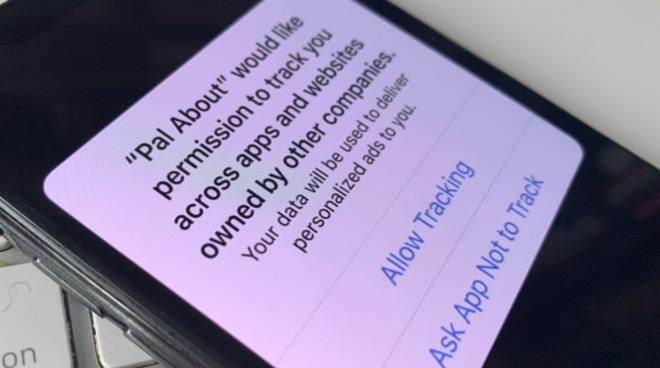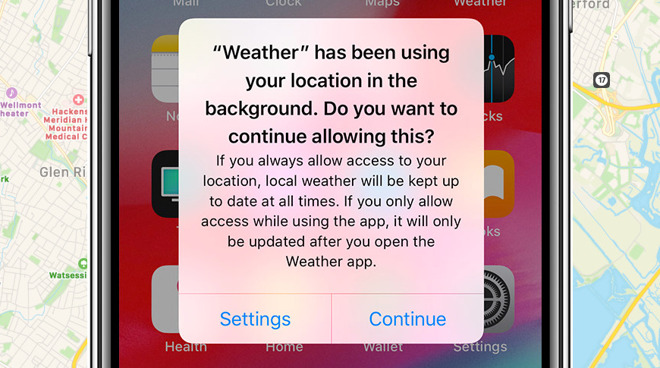French advertisers file complaint over Apple's iOS 14 privacy plan
A collection of advertisers and publishers in France have filed a complaint with the country's competition authority, claiming that iOS 14's blocking of automatic ad tracking will severely affect revenues.

Users will be asked to give permission app-by-app for ad tracking
Following months of complaints, a coalition of French advertisers and publishers have taken their case to France's French Autorite de la Concurrence (ADLC).
The coalition includes Interactive Advertising Bureau France, Mobile Marketing Association France, Syndicat des Regies Internet, and Union Des Entreprises de Conseil et Achat Media. They reportedly hope France will force Apple to further delay the changes, which had originally been set for September 2020.
Apple now intends to introduce the feature in 2021. When it's in place, all iPhone users will be specifically asked permission before any ad is allowed to track them.
The companies in the French consortium have previously pointed out that because of European regulations over GDPR data protection, iOS 14 users are effectively going to be asked twice, every time.
According to the Wall Street Journal, the coalition argues that this creates a barrier that will mean most users choosing to refuse ad tracking.
"At the highest level, this is a novel case -- a truly important case-- because it deals with the use of privacy as a sort of fig leaf for anticompetitive conduct," said Damien Geradin, the competition lawyer who represents the coalition. "We think that this is the sort of thing that will arise increasingly in the future."
"Particularly at the moment of a global pandemic crisis, it's not a good time to have another hit," said Nicolas Rieul, chair of Interactive Advertising Bureau France.

Advertisers fear a repeat of iOS's asking for permission to track location, which has seen very many users choose to block it
In response, an Apple spokesperson has reportedly repeated the company's stance that, "privacy is a fundamental right."
"A user's data belongs to them and they should get to decide whether to share their data and with whom," continued the spokesperson.
The coalition has pointed out that users will not be asked to accept ad tracking when using Apple apps. Apple, however, argues that because it does not share user data with other companies, it is not ad tracking in the industry's traditional sense.
Users know that the data is going to Apple, that it is not being sold to other firms to help target people with advertising. "These rules apply equally to all developers -- including Apple," said the spokesperson.
The new ad-tracking feature is part of Apple's plan for increased privacy, which also includes Sign In with Apple, which was announced at the same time.
Users will be asked to give permission app-by-app for ad tracking
Following months of complaints, a coalition of French advertisers and publishers have taken their case to France's French Autorite de la Concurrence (ADLC).
The coalition includes Interactive Advertising Bureau France, Mobile Marketing Association France, Syndicat des Regies Internet, and Union Des Entreprises de Conseil et Achat Media. They reportedly hope France will force Apple to further delay the changes, which had originally been set for September 2020.
Apple now intends to introduce the feature in 2021. When it's in place, all iPhone users will be specifically asked permission before any ad is allowed to track them.
The companies in the French consortium have previously pointed out that because of European regulations over GDPR data protection, iOS 14 users are effectively going to be asked twice, every time.
According to the Wall Street Journal, the coalition argues that this creates a barrier that will mean most users choosing to refuse ad tracking.
"At the highest level, this is a novel case -- a truly important case-- because it deals with the use of privacy as a sort of fig leaf for anticompetitive conduct," said Damien Geradin, the competition lawyer who represents the coalition. "We think that this is the sort of thing that will arise increasingly in the future."
"Particularly at the moment of a global pandemic crisis, it's not a good time to have another hit," said Nicolas Rieul, chair of Interactive Advertising Bureau France.
Advertisers fear a repeat of iOS's asking for permission to track location, which has seen very many users choose to block it
In response, an Apple spokesperson has reportedly repeated the company's stance that, "privacy is a fundamental right."
"A user's data belongs to them and they should get to decide whether to share their data and with whom," continued the spokesperson.
The coalition has pointed out that users will not be asked to accept ad tracking when using Apple apps. Apple, however, argues that because it does not share user data with other companies, it is not ad tracking in the industry's traditional sense.
Users know that the data is going to Apple, that it is not being sold to other firms to help target people with advertising. "These rules apply equally to all developers -- including Apple," said the spokesperson.
The new ad-tracking feature is part of Apple's plan for increased privacy, which also includes Sign In with Apple, which was announced at the same time.

Comments
I don’t remember a “right to spy” on users being a law in the EU.
So Apple's lame excuse works for both companies. Now, again, if Apple inclusively applies the rules equally across the board... with everyone, I agree it probably won't go anywhere. If they try to leave that exception for their tracking only it's going to go somewhere really quickly. It's just France now. That exception can lead to questions across the EU and the rest of the world.
This will have a negative affect on our advertising - how will we know when to push toilet paper?
We are EU companies ... we know there's the GDPR but we feel it should only be enforced against non-EU companies. If it's an EU company doing the data harvesting, we feel we have a right to all the user's data.
Thank you for your consideration.
Like my local supermarket can't just silently add a 10 EUR purchase and demand that I every time hit the opt-out button before okaying the payment; but they can ask if I want to add something, to which I very obviously must agree before they proceed to charge me for it. THAT is how tracking must function, that I as a user must go out of my way to opt-in; not that I per default are tricked into accepting it due to some convoluted weird language or complex structure of 100s of opt-out buttons for each vendor (like with some cookie-stuff).
Also, you can today use something like this to prevent a lot of the tracking done today: https://lockdownprivacy.com/
The problem with your assertion is that Apple no longer runs an advertising network. They failed spectacularly at it precisely because they didn't do user tracking and had a sky-high minimum buy. So basically they are trying to enforce what they thought best practice was for a non-invasive ad network to run. So Apple doesn't sell the data, and they have no ad network in which to use the data either. They have a good argument.
As for Google... Google *IS* the third party in this example. Because I don't spend any time in a "Google App" that might be tracking me. I spend time in apps that display ads from google and part of being within the google network, is that you have to pass metric data to them if you want to get the best ads. So this is developers being restricted from sharing data with GOOGLE, who is the third party and is buying your data from the developer who is collecting it as a first party.
The idea of sign-on with Apple further restricts that because then it is your option to even share your eMail with a first party developer, meaning that you can basically create a throw-away email that once you discover that the company you signed up with is distributing that email address, then you can shut it down and know who it was that violated your privacy by sharing data without your permission. It is the same as using [username]+[some unique code]@gmail.com, because you will know from the unique code you used which site published or leaked your email address.